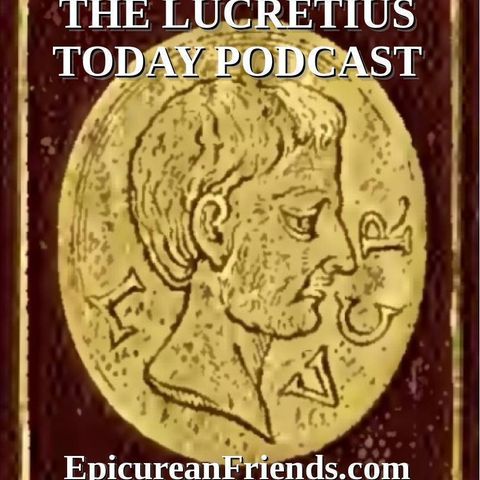Episode 237 - Cicero's OTNOTG - 12 - Isonomia And The Implications of Infinity

Sign up for free
Listen to this episode and many more. Enjoy the best podcasts on Spreaker!
Download and listen anywhere
Download your favorite episodes and enjoy them, wherever you are! Sign up or log in now to access offline listening.
Description
Welcome to Episode 237 of Lucretius Today. This is a podcast dedicated to the poet Lucretius, who wrote "On The Nature of Things," the most complete presentation of Epicurean philosophy...
show moreEach week we walk you through the Epicurean texts, and we discuss how Epicurean philosophy can apply to you today. If you find the Epicurean worldview attractive, we invite you to join us in the study of Epicurus at EpicureanFriends.com.
For our new listeners, let me remind you of several ground rules for both our podcast and our forum.
First: Our aim is to bring you an accurate presentation of classical Epicurean philosophy as the ancient Epicureans understood it.
Second: We won't be talking about modern political issues in this podcast. How you apply Epicurus in your own life is of course entirely up to you. We call this approach "Not Neo-Epicurean, But Epicurean." Epicurean philosophy is a philosophy of its own, it's not the same as Stoicism, Humanism, Buddhism, Taoism, Atheism, Libertarianism or Marxism - it is unique and must be understood on its own, not in terms of any conventional modern morality.
Third: One of the most important things to keep in mind is that the Epicureans often used words very differently than we do today. To the Epicureans, Gods were not omnipotent or omniscient, so Epicurean references to "Gods" do not mean at all the same thing as in major religions today. In the Epicurean theory of knowledge, all sensations are true, but that does not mean all opinions are true, but that the raw data reported by the senses is reported without the injection of opinion, as the opinion-making process takes place in the mind, where it is subject to mistakes, rather than in the senses. In Epicurean ethics, "Pleasure" refers not ONLY to sensory stimulation, but also to every experience of life which is not felt to be painful. The classical texts show that Epicurus was not focused on luxury, like some people say, but neither did he teach minimalism, as other people say. Epicurus taught that all experiences of life fall under one of two feelings - pleasure and pain - and those feelings -- and not gods, idealism, or virtue - are the guides that Nature gave us by which to live. More than anything else, Epicurus taught that the universe is not supernatural in any way, and that means there's no life after death, and any happiness we'll ever have comes in THIS life, which is why it is so important not to waste time in confusion.
Today we are continuing to review the Epicurean sections of Cicero's "On the Nature of The Gods," as presented by the Epicurean spokesman Velleius, and we are in Section19.
Today's Text
XIX. Surely the mighty power of the Infinite Being is most worthy our great and earnest contemplation; the nature of which we must necessarily understand to be such that everything in it is made to correspond completely to some other answering part. This is called by Epicurus ἰσονομία; that is to say, an equal distribution or even disposition of things. From hence he draws this inference, that, as there is such a vast multitude of mortals, there cannot be a less number of immortals; and if those which perish are innumerable, those which are preserved ought also to be countless. Your sect, Balbus, frequently ask us how the Gods live, and how they pass their time? Their life is the most happy, and the most abounding with all kinds of blessings, which can be conceived. They do nothing. They are embarrassed with no business; nor do they perform any work. They rejoice in the possession of their own wisdom and virtue. They are satisfied that they shall ever enjoy the fulness of eternal pleasures.
Information
| Author | Cassius Amicus |
| Organization | Cassius Amicus |
| Website | - |
| Tags |
-
|
Copyright 2024 - Spreaker Inc. an iHeartMedia Company
